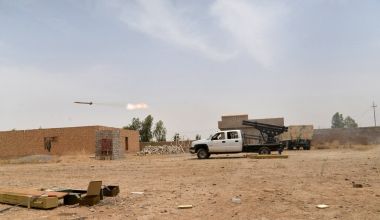Iraq: Oil refinery town set to fall to government forces in reverse for Islamic State

Iraqi forces backed by US-led coalition air strikes have opened supply lines into Baiji town and its nearby oil refinery, making progress at last against Islamic State rebels in a seesaw battle that has gone on for months, the Pentagon said on Monday.
Army Colonel Steve Warren, a Defense Department spokesman, said the Pentagon was not ready to declare Baiji refinery or the town "liberated" but progress was being made.
"In Baiji (town), the progress is more notable," Warren said. "Friendly forces have begun moving into the town and are methodically beginning to root out the enemy."
At the refinery, Iraqi troops have broken through to a contingent of Iraqi troops dug in at the northwest corner of the facility for several months and were able to deliver equipment and personnel to the men on the ground.
There was no single factor that had allowed the Iraqi forces to advance in the town and refinery, located at a strategic crossroads north of Tikrit on the main Baghdad-Mosul highway.
"This was a methodical and often times grinding movement from the south to the north," Warren said. "It took the friendly forces several weeks to be able to break through" an Islamic State defensive line.
The Iraqi force is comprised of a mix of conventional security forces and the so-called Popular Mobilization Forces, which tend to be Shi'ite militias.
Warren said the Shi'ite militias were under the control of the Iraqi government. Washington has declined to support Shi'ite militias that are not controlled by the central government.
Warren said the troops moving against the oil refinery were primarily conventional Iraqi security forces, while the Popular Mobilization Forces made up a majority of units operating in Baiji town.
Iranian-made artillery pieces were arrayed south of Baiji town on the east side of the Tigris river, parallel to the main Iraqi force moving up the west side of the river, Warren said.
"We don't know exactly who is firing those weapons," he said, noting it could be Iraqis or Iraqis with Iranian advisers.
Coalition air power has been supporting the bid to retake Baiji.
"Our air power we believe has been effective," he said. "You've seen strikes in and around the Baiji oil refinery and Baiji virtually every day," primarily targeting Islamic State tactical units in the open or defensive positions.
US President Barack Obama said on Monday the United States does not yet have a "complete strategy" for training Iraqi security forces to reconquer territory seized by Islamic State fighters. Speaking to reporters after meeting Iraqi Prime Minister Haider al-Abadi on the sidelines of a Group of Seven (G7) nations summit in Germany, Obama said more progress was needed to stem the flow of foreign fighters into Syria and Iraq.
All countries in an international coalition waging an air campaign against the Sunni Islamist militants were ready to do more to train Iraqi security forces if that would help.
"We want to get more Iraqi security forces trained, fresh, well-equipped and focused and (Prime Minister) Abadi wants the same thing so we're reviewing a range of plans for how we might do that," Obama told a news conference.
"We don't yet have a complete strategy because it requires commitments on the part of the Iraqis as well about how recruitment takes place, how that training takes place and so the details of that are not yet worked out."











